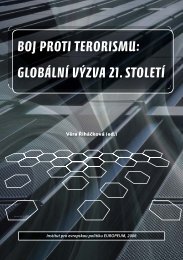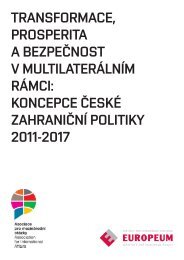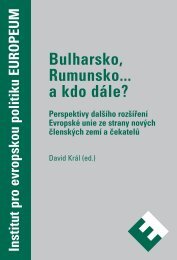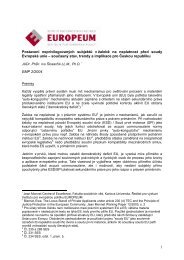eu constitutionalisation - EUROPEUM Institute for European Policy
eu constitutionalisation - EUROPEUM Institute for European Policy
eu constitutionalisation - EUROPEUM Institute for European Policy
You also want an ePaper? Increase the reach of your titles
YUMPU automatically turns print PDFs into web optimized ePapers that Google loves.
Chapter 7: Flexible Integration in the Common Foreign and Security <strong>Policy</strong>tant programmes figure “Tiger” (combat helicopter), “Boxer” (armouredutility vehicles) and “A400” (airlift). The latter one is important since itincludes third States <strong>for</strong> the first time namely Spain, Turkey, Belgium andLuxembourg. According to Article 8 of the Convention OCCAR’s mandateencompasses a comprehensive range of activities which makes it eligible tobecome a fully-fledged armaments agency.⁵⁵LoI is based on a common initiative by the six leading <strong>European</strong> armamentproducing countries (UK, France, Germany, Italy, Spain and Sweden)signed on 6 July 1998 pursuing the objective to harmonise existing regulations.They set up a number of working groups which mainly focused onissues of crossborder-restructuring and aspects of security in the realm ofarmament supply and in<strong>for</strong>mation. A comprehensive report was producedon the basis of their findings which shall, after ratification by the nationalparliaments, become an international treaty.⁵⁶The incorporation of these mechanisms into the <strong>European</strong> treaty regimemust be given highest priority in order to fully exploit the potential synergieswhich eventually may lead to a common policy in this field.B. Close bilateral cooperation between the member statesor in the framework of NATO or WEUAccording to Article 17 para 4 TEU „[t]he provisions of this Article shall notprevent the development of closer cooperation between two or more member stateson a bilateral level, in the framework of the Western <strong>European</strong> Union (WEU)andNATO” provided such cooperation does not run counter to or impede theimplementation of the CFSP. This kind of cooperation does not dependupon prior approval by the Council nor of the fulfilment of specific criteria asdeveloped with regard to enhanced cooperation. The most important exam-55) Article 8 of the OCCAR Convention stipulates: „OCCAR shall fulfil the following tasks, and such otherfunctions as the member states may assign to it: a) management of current and future cooperativeprogrammes, which may include configuration control and in-service support, as well as researchactivities; b) management of those national programmes of member states that are assigned to it;c)preparation of common technical specifications <strong>for</strong> the development and procurement of jointlydefined equipment; d) coordination and planning of joint research activities as well as, in cooperationwith appropriate military staffs, studies of technical solutions to meet future operation requirements;e) coordination of national decisions concerning the common industrial base and common technologies;f)coordination of both capital investments and the use of test facilities“.56) For more comprehensive in<strong>for</strong>mation see SCHMITT (2000) particularly 59.270Chapter 7: Flexible Integration in the Common Foreign and Security <strong>Policy</strong>ples of such cooperation are the WEAG/WEAO, OCCAR and the LoI. It isimportant to note that this clause has not been inserted into the Constitution,which however, must not be interpreted as a contrarius actus.In addition there exists a variety of multinational <strong>for</strong>ces. Best know ofthem is, of course, the Eurocorps which was created in 1992 on the basisof a Franco-German initiative. Meanwhile it draws it components fromfive countries (Germany, France, Spain, Belgium and Luxembourg) andis frequently referred to as the nucl<strong>eu</strong>s of a future <strong>European</strong> army.⁵⁷ Basedon a similar conceptualisation are the land and see <strong>for</strong>ces EUROFOR andEUROMARFOR which have been created in 1995 by France, Spain andItaly. Another concrete example stems from the German-Dutch Corps,which in 2003 assumed leadership of ISAF in Afghanistan. Accordinglythe Constitution invites participating member states to make these <strong>for</strong>cesavailable to future EU-led operations.⁵⁸C. No mechanisms of flexible integration outside theconstitutional treaty <strong>for</strong>eseenStrikingly the constitutional treaty does not provide a single legal basis onthe admissibility or not of co-operations outside the Treaty framework. Theobvious lack of any clarifying provision may be interpreted as implicitlyprecluding cooperation outside the treaties. In return one may assumegeneral admissibility as long as it does not affect the fundamental principlesof the Union and the established system of competences. Preferenceshould be put on the second option since the imposition of a general banof cooperation outside the Treaties would significantly limit national sovereigntyof the member states going far beyond the scope covered by theprinciple of solidarity as enacted in Article 11 para 1 TEU. This principleaims at preventing harmful action by the member states against the Unionbut it does not exclude per se activities outside the Treaty framework. Itfollows that cooperation remains admissible provided it respects the primacyof Community law.⁵⁹57) For detailed in<strong>for</strong>mation on the Eurocorps see WASSENBERG (1999).58) Article I-41 para 3 TCE states: “member states shall make civilian and military capabilities available tothe Union <strong>for</strong> the implementation of the common security and defence policy, to contribute to theobjectives defined by the Council. Those member states which together establish multinational <strong>for</strong>cesmay also make them available to the common security and defence policy.”59) DEHOUSSE, COUSSENS and GREVI (2004), p. 16.271








